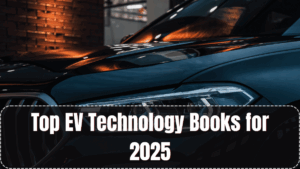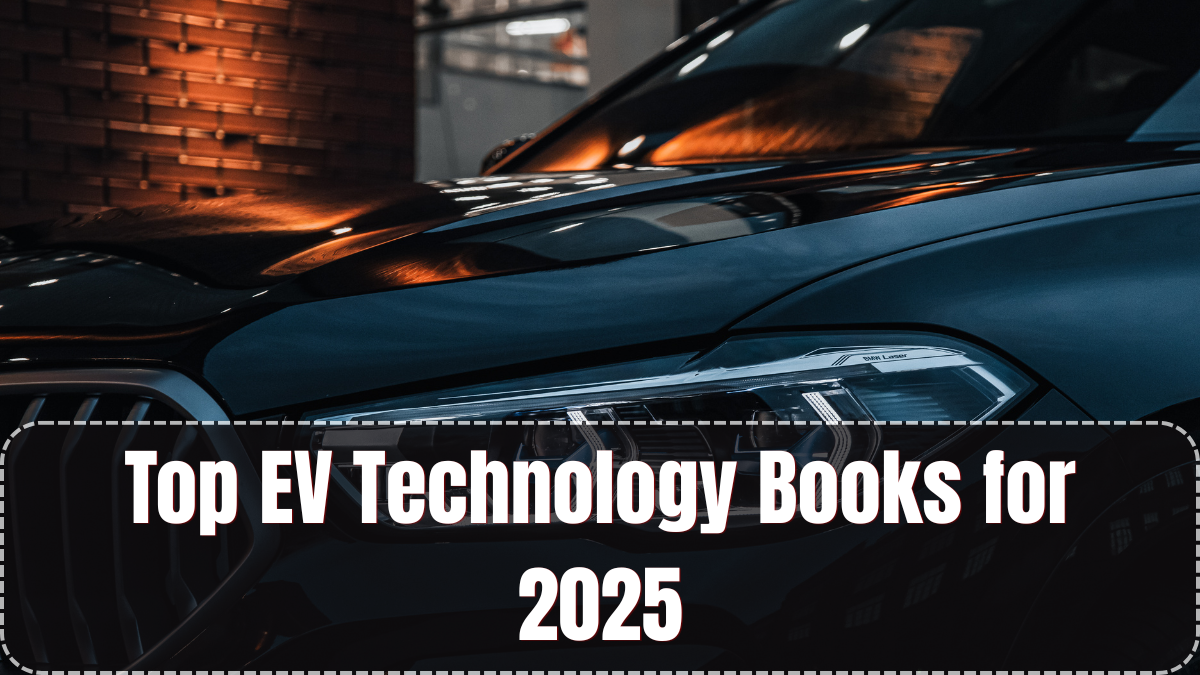As electric vehicles (EVs) dominate the automobile industry in 2025, mastering the science behind them has become essential for engineers, researchers, and students. With demand for EV specialists growing globally, the right books can be the foundation for your career. The EV Technology Books 2025 list is designed for both beginners and professionals looking to upskill in areas such as battery management systems (BMS), electric motors, EV charging infrastructure, and power electronics.
These books cover key fundamentals and offer insights into the latest industry practices and innovations, making them must-haves for anyone passionate about EV engineering.

Why EV Books Matter in 2025
The EV sector is evolving faster than traditional automotive engineering. New battery chemistries, fast-charging protocols, AI-based BMS, and thermal management systems are revolutionizing how EVs are designed and maintained. These EV Technology Books 2025 help learners:
-
Grasp the core concepts of EV architecture
-
Learn about cutting-edge technologies used by Tesla, Tata, BYD, and Hyundai
-
Build foundational knowledge for higher education or industry projects
-
Prepare for roles in EV startups, OEMs, and global mobility firms
With India, Europe, and North America pushing for full electrification, being updated through structured reading is no longer optional.
Top EV Technology Books Recommended for 2025
Here’s a curated list of the best EV engineering books available for Indian and international students in 2025:
-
Electric Vehicle Technology Explained (4th Edition) – James Larminie & John Lowry
-
Covers: EV fundamentals, battery systems, motors, and drivetrains
-
Perfect for: Engineering undergraduates and diploma students
-
-
Modern Electric Vehicle Technology – India Edition 2025 – NPTEL Academic Press
-
Focused on: Indian EV market, charging infrastructure, and local R&D
-
Suitable for: AICTE-approved course preparation
-
-
Battery Management Systems for Electric Vehicles – Gregory Plett
-
Deep dive into: Lithium-ion battery modeling, SOC estimation, thermal safety
-
Advanced level for MTech, PhD, or EV startup professionals
-
-
Electric Vehicle Engineering – Tata Technologies Handbook
-
Focus: Nexon EV platform, motor control systems, high-voltage safety
-
Industry-ready knowledge with real use cases
-
-
Hands-On EV Projects Using Arduino & Raspberry Pi – Practical Robotics Lab
-
Covers: EV telemetry, charger simulators, and controller programming
-
Excellent for: Engineering students with interest in embedded systems
-
These EV Technology Books 2025 are available online on Amazon, Flipkart, and college bookstores affiliated with engineering institutes.
Topics Covered in EV Books 2025
Most recommended books on this list cover the following areas:
-
Basics of EV architecture and system design
-
Battery chemistry: Li-ion, LFP, NMC, solid-state
-
Thermal management and battery cooling
-
Electric motor types: BLDC, PMSM, induction motors
-
Charging standards: CCS, CHAdeMO, Type-2, AC/DC systems
-
Regenerative braking and drive cycles
-
Power electronics and inverter control
-
BMS algorithms and CAN communication
-
Vehicle-to-Grid (V2G) and energy optimization
These books are enriched with real-world case studies, simulation problems, and QR-linked animations for better conceptual clarity.
Who Should Read EV Technology Books in 2025?
These books are suitable for:
-
Engineering students in mechanical, electrical, EEE, and EV-specific courses
-
ITI and polytechnic diploma holders exploring EV service technician roles
-
Faculty members designing updated EV syllabi
-
Automobile engineers transitioning from ICE to EV systems
-
Startup founders building electric two-wheelers, cars, or chargers
Whether you’re studying at IIT, NIT, a state engineering college, or part of an EV-focused bootcamp, these EV Technology Books 2025 provide clarity, structure, and up-to-date technical knowledge.
FAQs
Are these books suitable for beginners?
Yes. Books like Electric Vehicle Technology Explained and Modern Electric Vehicle Technology start from basic concepts and are ideal for beginners.
Do these books cover Indian EV standards?
Yes, Indian editions and locally published books include BIS norms, ARAI certifications, and real examples like Nexon EV or Ola S1.
Can these help in competitive exams like GATE?
Absolutely. Many chapters overlap with GATE EE, ECE, and ME syllabi, especially in power systems, control, and machines.
Are these books useful for practical EV projects?
Yes, especially the ones with hands-on content like the Arduino-based EV project book. They help you build real prototypes and simulators.
Where can I buy these books?
They are available on Amazon, Flipkart, NPTEL portal bookstores, and university bookshops offering 2025 updated curriculum materials.
Click here to know more.




